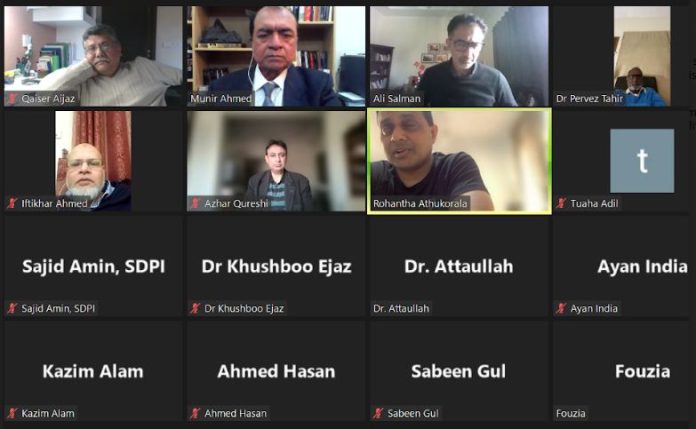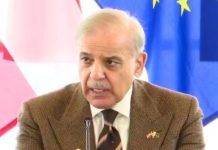DNA
Islamabad – Speaking at a webinar on Saturday, the economists warned of historic hard-times ahead for Pakistan even after the bailout package agreement with the International Monetary Fund (IMF) that is likely to be approved by the coming week. It would be a milestone that would pave the way for the release of an additional $1.2 billion in loans and unlock more funding from the IMF and other friendly countries.
They said Pakistan has to swallow the bitter pill but all the brunt shall not be on the general public. All the key stakeholders shall voluntarily come forward to take revolutionary economic measures to stop the drainage of the national exchequer. The immediate solutions are not less than to prevent public funds from embezzlement, to broaden the tax-base including the agricultural lords too, banning the luxury imports, and to rationalize the national consumption patterns. All types of mafia shall be taken to task.
The IMF is demanding to increase the General Sales Tax by one percent, from 17 percent to 18 percent. Government is also proposing to increase Federal Excise Duty on the purchase of business class air tickets and levy an additional 50 paisa FED per cigarette stick. The demand for circular debt reduction will also have an impact on the energy tariffs which may go by at least 25 percent. The levy of GST on Petroleum products is also being considered which will increase the prices by at least 17 percent. All of these will increase inflation rate and will further erode purchasing power of the masses.
The webinar was organized by the Devcom-Pakistan (Development Communications Network) and DTN on Saturday on the subject “IMF-Pakistan Deal: Impact and the Way Forward”. Pakistan’s Former chief economist Dr Pervez Tahir was the keynote speaker. The guest speakers included economist and Deputy Executive Director Sustainable Policy Development Institute Dr. Sajid Amin, Prime economic research institute Executive Director Ali Salman, development economist from Sri Lanka Dr. Rohantha Athukorala, Devcom-Pakistan Executive Director Munir Ahmed.
Dr. Pevez Tahir said with the rate of inflation at 27.6 percent and expected to rise steeply, food beyond the reach of the poor and the lower middle class and the fuel cost hitting even the middle and upper middle class, the common perception seems to be that things have to get worse before they get better.
He said Tax the rich and the privileged directly and target the poor and the low-income groups for subsidies. In the past, the governments got away with serious deviations and lukewarm reform efforts by pressuring the IMF through the US and European members of its Board in exchange for services rendered as the most allied ally during the Cold War and the non-NATO ally in the War on Terror. Since the withdrawal from Afghanistan, the West has lost interest in pushing the IMF around.
Dr. Sajid Amin said the IMF deal will add more to inflation, hence, the government shall take necessary measures to prevent the large segment of the public from the inflationary impact. There shall be no politics on the economy and avoid populist approach, rather all parties shall have consensus on the economic measure to avert default-like situation. The public expenditure shall be rationalized and made more efficient.
He suggested withdrawing the subsidies from different sectors for the targeted ones including food, energy and patrol. It is essential to redefine the growth model, a more conducive one in the present circumstances.
Ali Salman said what the government calls “tough and unimaginable” measures are not tough in real terms while some of them will fail to yield any substantial gains. They are not tough on the government and its institutions, which can recover costs and losses through more taxes and duties. They will continue to have free petrol and free electricity. Government shall withdraw tax exemptions provided to selected businesses, including those under the control of Army Welfare Trust. Also, need to withdraw subsidies provided to the textile and fertilizer sectors, and close down non-functioning Pakistan Steel Mills and sell out the property and pay salaries from real estate investment instead of appropriation from the supplementary grants.
He suggested bringing the rate of GST down to a single digit and stop the complicated process of refunds by converting into a single stage payment. The agricultural income tax shall come under the federal government through a constitutional amendment and start collecting this tax from this sector which is 20 percent of GDP, starting from the large farmers.
Dr. Rohantha Athukorala said that Pakistan was making the same mistake as Sri Lanka that delayed going to the IMF programme. Before the default, Sri Lanka was more dependent on external funds, having no sustainable internal growth model. Over expenditures and political instability led his country to a severe economic crisis.












